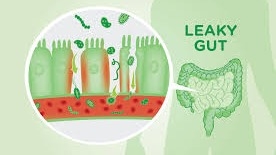Holistic Healing for Leaky Gut
Natural options for Leaky Gut Syndrome
Edited by Diana Drake - February 18, 2021
Numerous physical and mental health problems have been linked with this leakage in the intestines, including ADHT, Autism, Depression, Allergies, Asthma, and skin conditions like acne, eczema and psoriasis. Leaky Gut Syndrome may also be a factor in auto-immune diseases like Hashimoto's thyroiditis, arthritis, chronic fatigue and fibromyalgia.
The intestinal inflammation that causes leaky gut is brought on by a combination of factors. These include drugs (antibiotics, birth control pills, NSAIDs, chemotherapy agents, etc.), infection, parasites, food allergies and chemicals. Many people don't realize that processed foods, soda, and fast food are riddled with toxins. Even produce is sprayed with toxic pesticides and herbicides that hurt the body. Enzyme deficiencies and high carbohydrate diets are also contributing factors. Because the intestines do not absorb nutrients correctly when they are inflamed, fatigue and bloating is also a symptom/side effect. Leaking toxins also burden the liver, which acts as a second line of defense to eliminate substances absorbed from the intestines that the body doesn't want in the general circulation.
When large, undigested food particles are absorbed because of excessive porousness in the membranes, they trigger immune reactions. This can hypersensitize the immune system, resulting in allergic and autoimmune reactions. The inflammation also damages carrier proteins that help nutrients to be assimilated. This can cause nutritional deficiencies. Finally, the damaged intestinal membranes also allow bacteria, viruses ans yeast to pass more readily into the system to damage other organs and systems.
Reducing intestinal inflammation and rebuilding damaged intestinal membranes to stop gut leakage can help numerous health problems. With the supervision of a health professional, these are the 7 steps that can be taken to heal leaky gut naturally:
Step One: Avoid intestinal irritants, such as food allergens (work with a practitioner to identify these allergens specific to you), food additives, drugs and chemicals. You will also need to get on a "Gut Healing Diet" that is custom tailored to you.
Step Two: Improve digestion and increase stomach acid.
Step Three: Eliminate harmful organisms from the digestive tract. If parasites or bacterial overgrowth is part of the problem, these organisms need to be eliminated using natural therapies - not antibiotics. Fungal infections may be a problem as well. This is why it's important to work with a qualified naturopath to properly identify these pathogens and curate a plan for safe removal that wont damage the client or their gut.
Step Four: Bind intestinal toxins and improve colon transit time. Colon transit time is the length of time it takes for material to travel from one end of the alimentary canal to the other. In a healthy colon, this should be about 18-24 hours. To test your own colon transit time, eat food that "dyes" the stool (like beets or liquid chlorophyll) and see how long it takes the color to show up in the stool being eliminated. If it takes more than a day, then you have a sluggish colon transit time.
Step Five: Reduce intestinal inflammation. This is important to promote tissue regeneration and repair.
Step Six: Plug the leaks, meaning restore the integrity of the intestinal membranes.
Step Seven: Repopulate the colon with friendly bacteria.
People are amazed with how many health problems disappear and with how much better they generally feel when they heal their intestinal tract by reducing inflammation and putting a halt to gut leakage.
FDA DISCLAIMER - These statements and any information contained on this website have not been evaluated by the Food and Drug Administration. This information is intended for educational purposes only and is not meant to substitute for medical care or to prescribe treatment for any specific health condition. These products are not intended to diagnose, treat, cure or prevent any disease. Consult individual products labels for safety information.
THIS WEBSITE DOES NOT PROVIDE MEDICAL ADVICE - The information, including but not limited to, text, graphics, images and other material contained on this website are for informational purposes only. The purpose of this website is not intended to be a substitute for professional medical advice, diagnosis or treatment. Always seek the advice of your physician or other qualified health care provider with any questions you may have regarding a medical condition or treatment and before undertaking a new health care regimen, and never disregard professional medical advice or delay in seeking it because of something you have read on this website.
